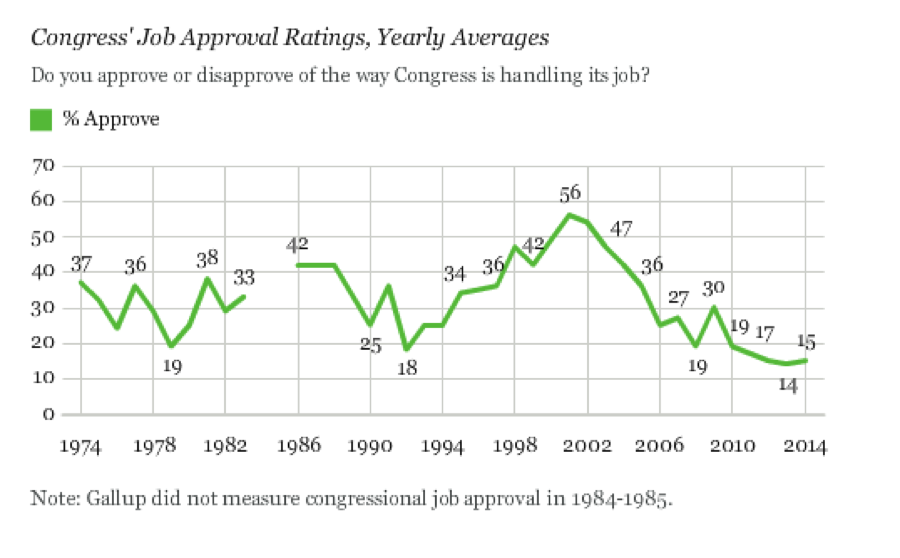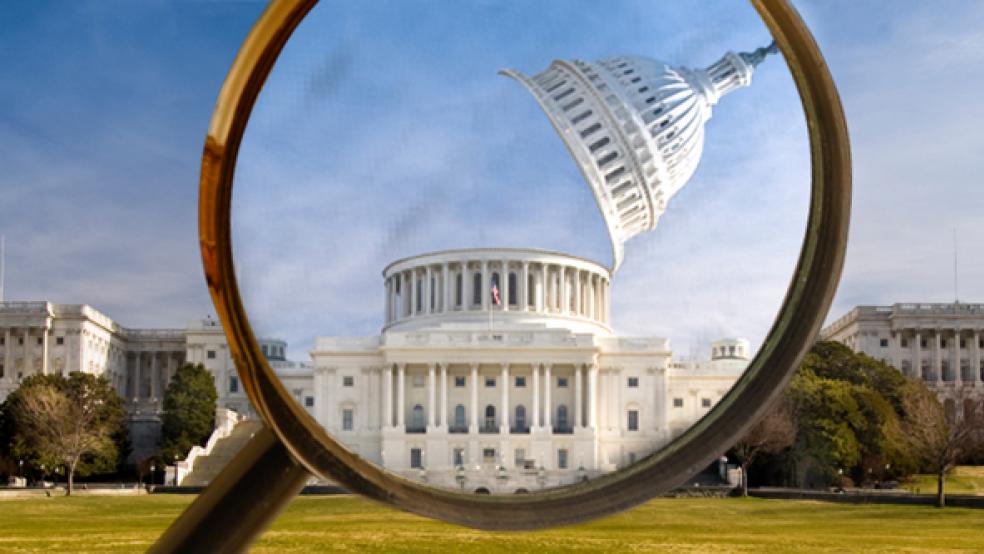Lawmakers on Capitol Hill are preparing to skip town for the holidays after closing out the year with one of the lowest job approval ratings on record.
With painfully predictable partisan gridlock, constant political infighting and an almost routine 11th hour spending battle that nearly resulted in another government shutdown, it’s no surprise that Congress has earned an alarming -- and consistent -- unfavorable reputation among the public.
Related: More Popular Than Congress: Cockroaches, Traffic, Root Canals
Indeed, only about 15 percent of the voting population thinks their elected members did a sufficient job this year, according to the latest Gallup poll. That’s one percentage point higher than last year’s 14 percent—the lowest approval rating ever recorded by the polling firm.
But this isn’t shocking news to anyone. Congress hasn’t seen a job approval rating above 20 percent in the last five years.

When it comes to disapproving of Congress—Republican and Democrat voters seem to be on the same page.
According to Gallup, among Republicans and Democrats, 15 percent said they approved of Congress’s job performance throughout 2014. The approval rating among independents was about 14 percent.
The pollsters attributed the low numbers to the divided Congress, and suggested it’s possible that the lawmakers will see their approval ratings climb next year when one party -- the GOP-- controls both houses.
“Over the past four years, Congress' approval ratings have been among the lowest Gallup has measured. Part of this may be attributed to the divided control of Congress, with neither party controlling both the House and Senate -- thus leaving both Republicans and Democrats with divided sentiments when asked to rate Congress as a whole,” Gallup’s Rebecca Riffkin said in a blog post.
“However, in January, when newly elected Republican senators are sworn in and Republicans begin controlling both houses of Congress, approval may increase as Americans who identify as Republicans become more positive.”
That doesn’t mean voters are optimistic about the future of Congress, Washington or the country in general. A separate poll from Pew Research Center found that seven in 10 voters say they expect Republicans and Democrats failure to work together over the next two years will hurt the country a lot. About 16 percent say it will hurt some. And about 4 in 5 expect it to hurt them personally.
Related: The Ten Richest Members of Congress in 2014
The poll found that neither Democrats nor Republicans expect the other to cooperate with them to get things done. Just one in five Republicans said they think President Obama will cooperate with GOP leaders. Meanwhile only 4 in 10 Republicans think GOP leaders will work with the president—and many of them are okay with that.
As Dan Balz notes in The Washington Post, the Pew survey suggests that dysfunction (and with it deepening pessimism about the system) is the new normal in American politics.”
“The findings about expectations for cooperation are worse than they were just eight years ago when the positions of the parties were the opposite — after Democrats took full control of Congress while Bush was still in the White House,” Balz wrote. “That deterioration is one more indicator of how much more embedded partisan divisions have become in the political system.”
Sure enough, pessimism among all voters seems to be spreading. The Pew poll found that only 49 percent of people expect 2015 to be better than last year. Among Democrats who historically have been optimistic about President Obama’s presidency, only 60 percent expect next year to be better—down from 80 percent last year. The 20-point drop is likely attributed to the Republicans victory in the midterm elections this year, with a GOP-controlled Congress likely to set up more political gridlock between Capitol Hill and the White House.
Meanwhile, Republican’s outlook on 2015 is similarly grim. Just 34 percent of Republicans expect next year to be better than this year.
Why This Matters:
While most employees who fail a performance review wouldn’t be able to keep their jobs, Congress consistently gets poor marks with no consequences. Of course, their own constituents might give them higher grades, but the national opinion of the 113th Congress is overwhelmingly negative. They’ve been named the most unproductive Congress in history— with only 201 bills signed into law—just 32 of which were major pieces of legislation.
Top Reads from The Fiscal Times





